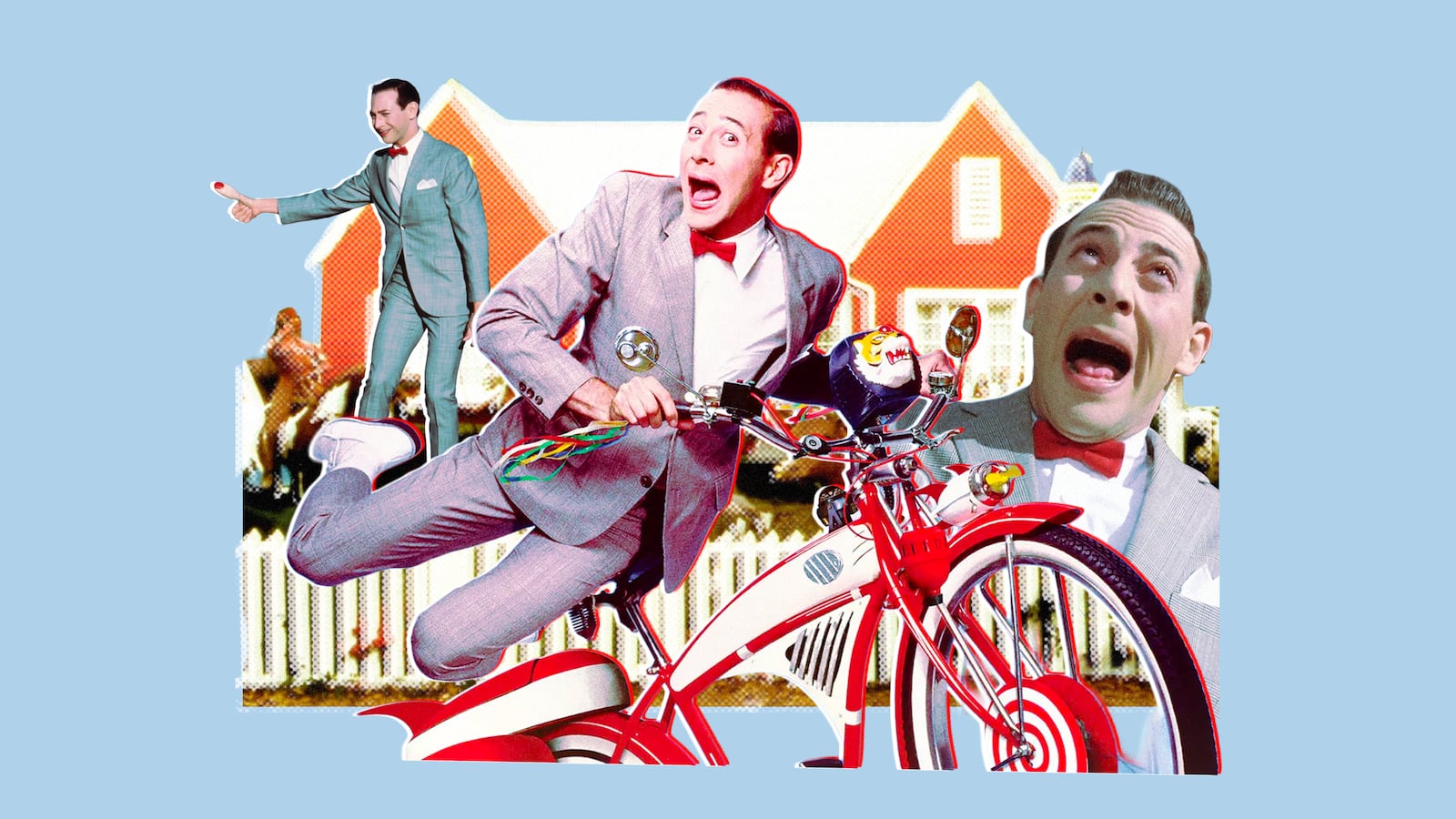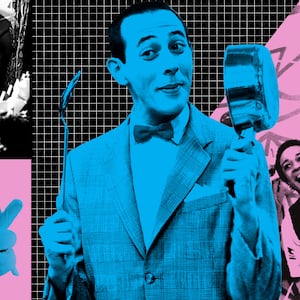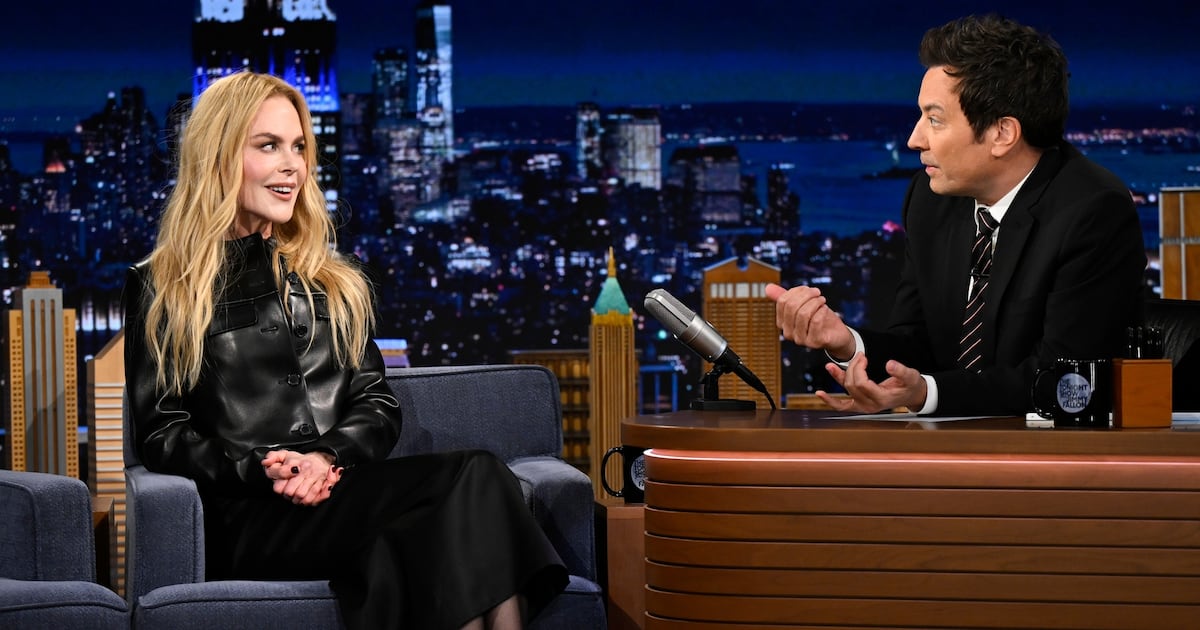Pee-wee’s Big Adventure is one of cinema’s great debuts, both for its director Tim Burton and for its late star Paul Reubens. Pee-wee Herman—a man-child with closely cropped hair, a nasally voice, and eccentric barking laugh, and a trademark uniform consisting of a gray suit, red bowtie and white sneakers—emerged into the mainstream as a genuine, fully formed original. There was simply no one like Pee-wee and nothing like his maiden big-screen outing, which came across as a delirious expression of his idiosyncratic personality and paved the way for a Saturday morning television series that played like a similar manifestation of his quirky soul.
He was, in his own way, perfect, and so too was his big adventure.
Reubens, who passed away Sunday at age 70 following a private bout with cancer, began developing his one-of-a-kind character in the early ’80s, with his stage production The Pee-wee Herman Show as well as via regular appearances on Late Night with David Letterman. Still, from the moment it arrived in theaters in 1985, Pee-wee’s Big Adventure was something quite obviously and thrillingly new.
That began, of course, with Pee-wee himself. Wearing a suit that was always just a little short in the arms and legs, he resided in a house filled with Rube Goldberg-ish contraptions, ate Mr. T cereal, giggled and goofed off with adolescent glee, and loved his glorious red-and-white bike (with that awesome lion siren on its handlebars) like nothing else. Though he lived alone, Pee-wee was clearly not a grown-up in any traditional sense, and that was further hammered home by his schoolyard-esque rivalry with spoiled rich-kid Francis (Mark Holton), a cretin who coveted Pee-wee’s bike and—courtesy of Holton’s exceptional performance—is now so synonymous with greedy, selfish entitlement that, to this day, I can’t meet anyone with his name without instinctively hearing Pee-wee’s sneering pronunciation of it in my head.

Pee-wee’s Big Adventure is the story of Pee-wee’s search for his beloved ride after it’s stolen from a parking lot—a crime he correctly suspects has been committed by Francis. Following a swimming pool fight with the wealthy bully that reveals childlike Pee-wee’s more ferocious side, Francis has the bike surreptitiously sent away in order to avoid being caught red-handed. When a psychic tells Pee-wee that he can find what he’s looking for in the basement of the Alamo, a quest is born.
The ensuing odyssey is chockablock with nuttiness: Pee-wee hitches a ride with both escaped convict Mickey (Judd Omen) and trucker Large Marge (Alice Nunn), whose true nature is revealed in unforgettable bug-eyed fashion; he strikes up a friendship with Paris-loving waitress Simone (Diane Salinger) at a roadside stop marked by a giant dinosaur statue; he rides in a rodeo to avoid a run-in with Simone’s boyfriend; and he dances on the bar of a biker hangout to “Tequila” in his tip-toeing platform shoes, his moves (Hands in front! Hands in back!) so awesomely ridiculous that they became arguably the most recognizable and oft-mimicked routine of the ’80s and ’90s.
Pee-wee’s Big Adventure’s road-trip format is an ideal vehicle for its protagonist, allowing him to encounter and interact with a wide variety of Americans who view him first with curiosity and then admiration, if not outright devotion. In the person of Dottie (E.G. Daily), he’s also seen as a coveted paramour. However, as befitting his weirdly ambiguous age, Pee-wee isn’t initially comfortable with anything romantic. Rather, his sole focus is recovering his bike. That mission ultimately takes him to Hollywood, where it’s being used by a bratty kid actor (Jason Hervey) in a nun-centric studio film, and where Pee-wee becomes a media-sensation hero for saving animals (even snakes!) from a burning pet shop.
Through it all, Reubens embodies Pee-wee as a genial, cackling innocent: courageous, pure of heart and slightly smartass-y. He’s strange and sweet, cheery and crazy, and compassionate as well as devilishly mischievous. Reubens makes him a ball of lovably bizarre energy but also shrewdly hints at his immature arrogance and naughtiness, the better to lend him a faint if unmistakable edge—something that was slightly lost once he transitioned to Saturday morning TV with Pee-wee’s Playhouse.
In the first of his many collaborations with Danny Elfman (whose sprightly score is an all-timer), Burton shoots his action with the gee-whiz wonder of a 10-year-old unleashed, his own darker offbeat impulses melding seamlessly with Reubens’ bright candy-colored, hyper-real madness.
In look, sound, atmosphere and attitude, Pee-wee’s Big Adventure is a giddy fantasia, all wacko set design, cartoony pacing and unexpected, inexplicable Pee-wee vivacity, and its humor is driven by Reubens’ preternatural gift for funny faces and funnier scenarios and one-liners. It’s like an explosion of juvenile wackiness, and its gags are so rock-solid that they endure both on the screen and in one’s memory, be it Pee-wee doing absurd bike tricks (“I meant to do that”), trading barbs with Francis (“I know you are but what am I?”), or reveling in his newfound friends’ excitement during an art-imitating-life movie-premiere finale that—fitting for a film this imaginative—has the uproarious nerve to morph into a subtle 8 ½ homage.

An assuredly loony comedy that feels as if it sprang wholesale from its hero’s subconscious, Pee-wee’s Big Adventure is, in its own inimitable way, flawless. Reubens went on to have tremendous success with the equally gonzo—if deliberately more wholesome—Pee-wee’s Playhouse, and he’d twice try to reimagine Pee-wee in uniquely off-kilter cinematic terms with the admirable (if lesser) Big Top Pee-wee and Pee-wee’s Big Holiday. All the while, his career had its fair share of ups and downs, from strong supporting parts in Batman Returns, Buffy the Vampire Slayer, Mystery Men, and Blow (among others), to the 1991 arrest that made tabloid headlines and put Pee-wee on decade-long ice, to his and the iconic character’s subsequent, well-received comeback.
In every guise, he was a dexterous and amusingly demented actor. Nonetheless, what he created with Burton in 1985 was so impeccable, so hilarious, and so purely Pee-wee that it remains his crowning achievement. Praise its name as long as you like—it’ll never wear out.
Keep obsessing! Sign up for the Daily Beast’s Obsessed newsletter and follow us on Facebook, Twitter, Instagram and TikTok.







